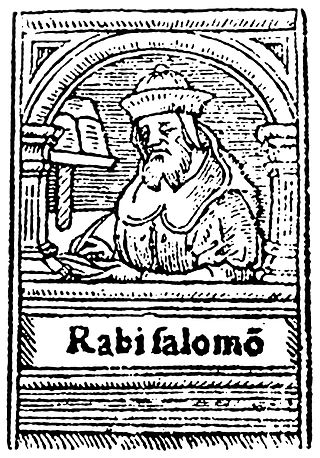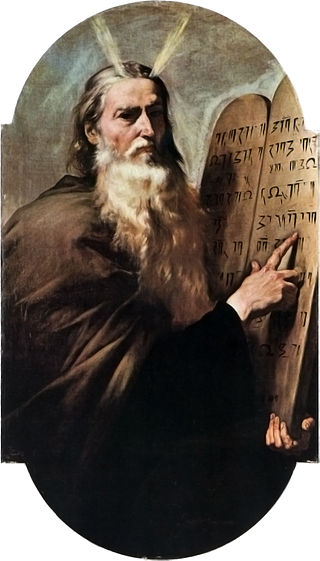Torah refers to the first five books of the Hebrew Bible (the Pentateuch), and the law derived from them.
Contents
Torah may also refer to:
Torah refers to the first five books of the Hebrew Bible (the Pentateuch), and the law derived from them.
Torah may also refer to:
The Old Testament (OT) is the first division of the Christian biblical canon, which is based primarily upon the 24 books of the Hebrew Bible or Tanakh, a collection of ancient religious Hebrew and occasionally Aramaic writings by the Israelites. The second division of Christian Bibles is the New Testament, written in the Koine Greek language.
The Pentateuch is the first part of the Bible, consisting of Genesis, Exodus, Leviticus, Numbers, and Deuteronomy.

Shlomo Yitzchaki, generally known by the acronym Rashi, was a medieval French rabbi, the author of comprehensive commentaries on the Talmud and Hebrew Bible.

The Torah is the compilation of the first five books of the Hebrew Bible, namely in English (Judaism) the books of Genesis, Exodus, Leviticus, Numbers and Deuteronomy. It is known as the Pentateuch or the Five Books of Moses by Christians. It is also known as the Written Torah in Jewish tradition. If meant for liturgic purposes, it takes the form of a Torah scroll. If in bound book form, it is called Chumash, and is usually printed with the rabbinic commentaries.

The Hebrew Bible or Tanakh, also known in Hebrew as Miqra, is the canonical collection of Hebrew scriptures, including the Torah, the Nevi'im, and the Ketuvim. Different branches of Judaism and Samaritanism have maintained different versions of the canon, including the 3rd-century Septuagint text used in Second Temple Judaism, the Syriac Peshitta, the Samaritan Pentateuch, the Dead Sea Scrolls, and most recently the 10th-century medieval Masoretic Text compiled by the Masoretes, currently used in Rabbinic Judaism. The terms "Hebrew Bible" or "Hebrew Canon" are frequently confused with the Masoretic Text, however, this is a medieval version and one of several texts considered authoritative by different types of Judaism throughout history. The current edition of the Masoretic Text is mostly in Biblical Hebrew, with a few passages in Biblical Aramaic.
ArtScroll is an imprint of translations, books and commentaries from an Orthodox Jewish perspective published by Mesorah Publications, Ltd., a publishing company based in Rahway, New Jersey. Rabbi Nosson Scherman is the general editor.

Samson Raphael Hirsch was a German Orthodox rabbi best known as the intellectual founder of the Torah im Derech Eretz school of contemporary Orthodox Judaism. Occasionally termed neo-Orthodoxy, his philosophy, together with that of Azriel Hildesheimer, has had a considerable influence on the development of Orthodox Judaism.

The Law of Moses, also called the Mosaic Law, primarily refers to the Torah or the first five books of the Hebrew Bible. It is the law revealed to Moses by God.
Torah reading is a Jewish religious tradition that involves the public reading of a set of passages from a Torah scroll. The term often refers to the entire ceremony of removing the scroll from the Torah ark, chanting the appropriate excerpt with special cantillation (trope), and returning the scroll(s) to the ark. It is also commonly called "laining".

Chumash is a Torah in printed and book bound form as opposed to a Sefer Torah, which is a scroll.

Joseph Herman Hertz was a British Rabbi and biblical scholar. He held the position of Chief Rabbi of the United Kingdom from 1913 until his death in 1946, in a period encompassing both world wars and the Holocaust.
Hebrew Bible English translations are English translations of the Hebrew Bible (Tanakh) according to the Masoretic Text, in the traditional division and order of Torah, Nevi'im, and Ketuvim. Most Jewish translations appear in bilingual editions (Hebrew–English).
The prophetic books are a division of the Christian Bible, grouping 18 books or 17 books in the Old Testament. In terms of the Tanakh, it includes the Latter Prophets from the Nevi'im, with the addition of Lamentions and Daniel, both of which are included among the books of the Hebrew Ketuvim.
Soncino Press is a Jewish publishing company based in the United Kingdom that has published a variety of books of Jewish interest, most notably English translations and commentaries to the Talmud and Hebrew Bible. The Soncino Hebrew Bible and Talmud translations and commentaries were widely used in both Orthodox and Conservative synagogues until the advent of other translations beginning in the 1990s.
Jewish commentaries on the Bible are biblical commentaries of the Hebrew Bible from a Jewish perspective. Translations into Aramaic and English, and some universally accepted Jewish commentaries with notes on their method of approach and also some modern translations into English with notes are listed.
Chumash may refer to:

Mosaic authorship is the Judeo-Christian tradition that the Torah, the first five books of the Hebrew Bible/Old Testament, were dictated by God to Moses. The tradition probably began with the legalistic code of the Book of Deuteronomy and was then gradually extended until Moses, as the central character, came to be regarded not just as the mediator of law but as author of both laws and narrative.

Sifrei Kodesh, commonly referred to as sefarim, or in its singular form, sefer, are books of Jewish religious literature and are viewed by religious Jews as sacred. These are generally works of Torah literature, i.e. Tanakh and all works that expound on it, including the Mishnah, Midrash, Talmud, and all works of halakha, Musar, Hasidism, Kabbalah, or machshavah. Historically, sifrei kodesh were generally written in Hebrew with some in Judeo-Aramaic or Arabic, although in recent years, thousands of titles in other languages, most notably English, were published. An alternative spelling for 'sefarim' is seforim.
The Tanakh or Tanak is the Hebrew Bible, the canonical collection of Jewish texts, which is also the textual source for most of the Christian Old Testament. It is an acronym, made of the initial consonants of the Hebrew words Torah, Nevi'im (prophets), and Ketuvim (writings).
The earliest known precursor to Hebrew, an inscription in the Paleo-Hebrew alphabet, is the Khirbet Qeiyafa Inscription, if it can be considered Hebrew at that early a stage.